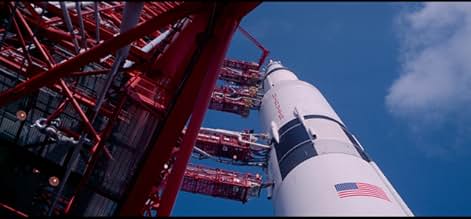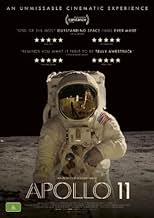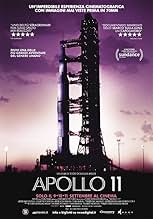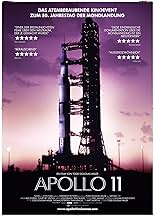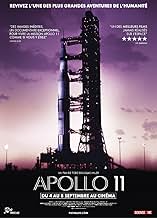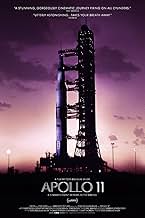ÉVALUATION IMDb
8,1/10
28 k
MA NOTE
La mission Apollo 11 d'atterrissage sur la lune menée par le commandant Neil Armstrong ainsi que les pilotes Buzz Aldrin et Michael Collins.La mission Apollo 11 d'atterrissage sur la lune menée par le commandant Neil Armstrong ainsi que les pilotes Buzz Aldrin et Michael Collins.La mission Apollo 11 d'atterrissage sur la lune menée par le commandant Neil Armstrong ainsi que les pilotes Buzz Aldrin et Michael Collins.
- A remporté 3 prix Primetime Emmy
- 59 victoires et 44 nominations au total
Neil Armstrong
- Self - Mission Commander
- (archive footage)
Mike Collins
- Self - Command Module Pilot
- (archive footage)
Buzz Aldrin
- Self - Lunar Module Pilot
- (archive footage)
- (as Edwin 'Buzz' Aldrin)
Deke Slayton
- Self - Director of Flight Crew Operations
- (archive footage)
Clifford E. Charlesworth
- Self - Flight Director Green Team
- (archive footage)
Bruce McCandless II
- Self - Capsule Commuicator (CAPCOM) Green Team
- (archive footage)
- (as Bruce McCandless)
Charles Duke
- Self - Capsule Communicator (CAPCOM) White Team
- (archive footage)
Gene Kranz
- Self - Flight Director White Team
- (archive footage)
Jim Lovell
- Self - Backup Commander
- (archive footage)
John F. Kennedy
- Self - President of the United States of America
- (archive footage)
Janet Armstrong
- Self
- (archive footage)
Patricia Mary Finnegan
- Self
- (archive footage)
Andy Aldrin
- Self
- (archive footage)
Joan Ann Archer
- Self
- (archive footage)
- (uncredited)
Walter Cronkite
- Self
- (archive footage)
- (uncredited)
Lyndon B. Johnson
- Self
- (archive footage)
- (uncredited)
Avis en vedette
"I didn't feel like a giant. I felt very, very small." Neil Armstrong looking on earth from the moon.
If somehow you missed Apollo 11's flight to the moon in 1969 (indeed you might not have been born yet), fear not: The perfect documentary about those three real superheroes is here. The titular doc stars Neil Armstrong, Buzz Aldrin, and Michael Collins in nail biting suspense and no explosions save rocket propulsion.
The only part not of the original footage is the original synth drones' soundtrack by an inspired Matt Morton. The percussive beat has pomp like that of a thriller in which the president has a fleet of black SUV's rolling to its heart-beating energy, supporting a blockbuster that this time is for real.
Notwithstanding the deeply introspective First Man, starring Ryan Gosling as Armstrong, the real Armstrong comes through in this doc. As expected, he's like the straight arrow he is alleged to be-good guy, slightly nerdy, smart, evident even with as little face time as he has here.
Maybe that's the point: Without the sophisticated computers we have 50 years later, these astronauts and technicians work hard long hours together, no claims to glory, profit, or party loyalty. Their collaboration is worthy of any Marvel voyage; only it's real.
New images and sounds emerge despite the decades of depicting this event in multi-media. Some NASA shots have never been seen before. Although the images may not be as spectacular as the ones we've grown accustomed to, they represent the constantly renewable glory of mankind at its technological best, devoid of petty ego embellishments and full of human connections.
You'll find more dramatic renditions of this adventure, but you'll never find 93 minutes more perfectly capturing the grandeur of science and humanity working together to realize the impossible. This right stuff is right here in a grand documentary called, very simply, Apollo 11.
If somehow you missed Apollo 11's flight to the moon in 1969 (indeed you might not have been born yet), fear not: The perfect documentary about those three real superheroes is here. The titular doc stars Neil Armstrong, Buzz Aldrin, and Michael Collins in nail biting suspense and no explosions save rocket propulsion.
The only part not of the original footage is the original synth drones' soundtrack by an inspired Matt Morton. The percussive beat has pomp like that of a thriller in which the president has a fleet of black SUV's rolling to its heart-beating energy, supporting a blockbuster that this time is for real.
Notwithstanding the deeply introspective First Man, starring Ryan Gosling as Armstrong, the real Armstrong comes through in this doc. As expected, he's like the straight arrow he is alleged to be-good guy, slightly nerdy, smart, evident even with as little face time as he has here.
Maybe that's the point: Without the sophisticated computers we have 50 years later, these astronauts and technicians work hard long hours together, no claims to glory, profit, or party loyalty. Their collaboration is worthy of any Marvel voyage; only it's real.
New images and sounds emerge despite the decades of depicting this event in multi-media. Some NASA shots have never been seen before. Although the images may not be as spectacular as the ones we've grown accustomed to, they represent the constantly renewable glory of mankind at its technological best, devoid of petty ego embellishments and full of human connections.
You'll find more dramatic renditions of this adventure, but you'll never find 93 minutes more perfectly capturing the grandeur of science and humanity working together to realize the impossible. This right stuff is right here in a grand documentary called, very simply, Apollo 11.
This documentary was made using a lot of recently discovered film, much of it is high-definition, large format film. It truly gives amazing images.
But the story of course is the real meat here. I attended the same University as Armstrong, I had just graduated with my Master's when the Moon landing happened. I remember it well and will always have a connection, Armstrong and I walked the same college walkways, had classes in some of the same buildings, both watched the Boilermakers play football in the same stadium. Just a few years apart.
Recently I discovered separate online interviews with both Armstrong and Aldrin, in the documentary we see them as young men about to get the ride of a lifetime, then we see them nearer the end of their lives putting it all in perspective.
Great documentary, worth a viewing for anyone.
But the story of course is the real meat here. I attended the same University as Armstrong, I had just graduated with my Master's when the Moon landing happened. I remember it well and will always have a connection, Armstrong and I walked the same college walkways, had classes in some of the same buildings, both watched the Boilermakers play football in the same stadium. Just a few years apart.
Recently I discovered separate online interviews with both Armstrong and Aldrin, in the documentary we see them as young men about to get the ride of a lifetime, then we see them nearer the end of their lives putting it all in perspective.
Great documentary, worth a viewing for anyone.
The restored 70mm footage looks like it was shot yesterday. It will make your jaw drop on the massive screen. There's something simply astounding about old restored 35mm, 65mm and 70mm footage viewed in full resolution today - it's like stepping into a time-machine and being transported, like you are really there. Any 70mm footage projected on an IMAX screen is simply magical, but this is not just real footage, but footage capturing possibly the most important moment in human history - certainly the most inspiring. You won't be able to experience the same thing at home, so I wish everyone would go out to their local IMAX and experience this first-hand. This is the kind of thing schools should require their students to experience.
The only reason I don't give it a perfect 10/10 is that because the film is made in a cinéma-vérité style, the audience simply experiences the event without really learning very much about the incredible engineering, science, training and logistics of the incredible Apollo program. So I hope this film inspires people to also seek out The Right Stuff (1983), Apollo 13 (1995), the massively underrated miniseries From the Earth to the Moon (1998) and the invaluable documentary In the Shadow of the Moon (2007) - possibly the definitive documentary about the Apollo program - which you should watch as a companion piece to this film.
The only reason I don't give it a perfect 10/10 is that because the film is made in a cinéma-vérité style, the audience simply experiences the event without really learning very much about the incredible engineering, science, training and logistics of the incredible Apollo program. So I hope this film inspires people to also seek out The Right Stuff (1983), Apollo 13 (1995), the massively underrated miniseries From the Earth to the Moon (1998) and the invaluable documentary In the Shadow of the Moon (2007) - possibly the definitive documentary about the Apollo program - which you should watch as a companion piece to this film.
A half-century ago, Neil Armstrong stepped off the ladder of the Lunar Module Eagle and into the history books. In the decades since, that moment and the flights of NASA's Apollo program have been chronicled in seemingly countless documentaries. At the top of that list remains 1989's For All Mankind from the late Al Reinert and 2007's In The Shadow Of The Moon from British filmmakers David Sington and Christopher Riley. Up there with them now is 2019's Apollo 11, an exciting new film from Todd Douglas Miller that is begging for you to see it on the biggest screen possible.
Why?
In part because of Miller who, like those other great filmmakers of Apollo before him, wasn't content to merely do a rehash of what had come before. Miller's Apollo 11 is in part a deep dive into the NASA archives, uncovering things that even the most seasoned space enthusiast has likely never seen before. There's a wealth of pre-launch footage, for example, tracing the preparations from the rollout of the massive Saturn V rocket to the launch pad to multiple perspectives of the launch itself. Even when events move into space, there's still a wealth of rare material to experience including conversations between the astronauts themselves as well as between them and Mission Control in Houston. Even where footage that has become synonymous with the mission and the era such as the stage separations of the rocket or the Lunar Module's descent to the surface of the Moon, it's presented with clarity and scale rarely seen elsewhere. For that alone, the film renders excellent service.
It does so in other ways, as well. Unlike those two documentaries I mentioned at the top of this review, Miller doesn't use astronaut interviews (either aural or visual) to help tell the story. Instead, Apollo 11 unfolds entirely through archival sources ranging from the transmissions to the voice of NASA's public affairs or well-known TV commentators like Walter Cronkite. To help aid visually for parts of the mission where there isn't much or anything to show, the film employees simple animation alongside such commentaries. The film also makes effective use of split-screen and captions to portray mission control or to show events such as the actual walk on the Moon from multiple perspectives. As much as the footage itself on a cinema screen does, it presents the sheer scale of the endeavor but without losing the viewer in the technicalities involved in spaceflight.
In some ways, that's the greatest triumph of Apollo 11 the documentary. It's a film keen to present Apollo 11 the mission in awe-inspiring yet understandable terms, one that emphasizes how incredible in scope and achievement that flight five decades ago this July was. It's also a reminder, at a time when cinema screens find themselves increasingly dominated by would-be blockbusters and superhero flicks, of the raw power of cinema to present stories. Both of those are things we need reminding of, it seems, and the film does a superb job of both.
Why?
In part because of Miller who, like those other great filmmakers of Apollo before him, wasn't content to merely do a rehash of what had come before. Miller's Apollo 11 is in part a deep dive into the NASA archives, uncovering things that even the most seasoned space enthusiast has likely never seen before. There's a wealth of pre-launch footage, for example, tracing the preparations from the rollout of the massive Saturn V rocket to the launch pad to multiple perspectives of the launch itself. Even when events move into space, there's still a wealth of rare material to experience including conversations between the astronauts themselves as well as between them and Mission Control in Houston. Even where footage that has become synonymous with the mission and the era such as the stage separations of the rocket or the Lunar Module's descent to the surface of the Moon, it's presented with clarity and scale rarely seen elsewhere. For that alone, the film renders excellent service.
It does so in other ways, as well. Unlike those two documentaries I mentioned at the top of this review, Miller doesn't use astronaut interviews (either aural or visual) to help tell the story. Instead, Apollo 11 unfolds entirely through archival sources ranging from the transmissions to the voice of NASA's public affairs or well-known TV commentators like Walter Cronkite. To help aid visually for parts of the mission where there isn't much or anything to show, the film employees simple animation alongside such commentaries. The film also makes effective use of split-screen and captions to portray mission control or to show events such as the actual walk on the Moon from multiple perspectives. As much as the footage itself on a cinema screen does, it presents the sheer scale of the endeavor but without losing the viewer in the technicalities involved in spaceflight.
In some ways, that's the greatest triumph of Apollo 11 the documentary. It's a film keen to present Apollo 11 the mission in awe-inspiring yet understandable terms, one that emphasizes how incredible in scope and achievement that flight five decades ago this July was. It's also a reminder, at a time when cinema screens find themselves increasingly dominated by would-be blockbusters and superhero flicks, of the raw power of cinema to present stories. Both of those are things we need reminding of, it seems, and the film does a superb job of both.
Should be mandatory watching for all the folks that have lost the feeling of global humanity. I remember it from 50 years ago and I feel proud of the world as it looked then and the can do attitudes. The grace and humility of Neil Armstrong and crew was amazing. I was excited at each event and the music was marvelous. You know they make it but the tension was intense. so much could have gone wrong. What was error 202 !!!
Le saviez-vous
- AnecdotesSeveral of the recordings captured by the astronauts during the mission are featured in this documentary. These recordings by Neil Armstrong, Buzz Aldrin and Mike Collins earned them honorary memberships in the American Society of Cinematographers.
- GaffesThe incident involving Buzz Aldrin's bio-med sensors going out, leading him to crack wise, saying, "I promise I will let you know if I stop breathing," occurred during the return voyage, on day 8 of the mission, but is depicted (at approx 48 minutes into the film) as happening during the approach to the moon before the separation of the command and lunar modules.
- Citations
Neil Armstrong: One small step for man... one giant leap for mankind.
- Autres versionsIn 2019, an edited version of the film, cut down to 45 minutes for exhibition in museum IMAX theaters, was released as Apollo 11: First Steps.
- ConnexionsFeatured in WatchMojo: Top 10 Best Movies of 2019 (So Far) (2019)
- Bandes originalesMother Country
Written and Performed by John Stewart
Meilleurs choix
Connectez-vous pour évaluer et surveiller les recommandations personnalisées
Détails
- Date de sortie
- Pays d’origine
- Sites officiels
- Langue
- Aussi connu sous le nom de
- Apollo 11: First Steps
- Lieux de tournage
- Sea of Tranquility, The Moon, Space(Apollo 11 landing site)
- sociétés de production
- Consultez plus de crédits d'entreprise sur IMDbPro
Box-office
- Brut – États-Unis et Canada
- 9 039 891 $ US
- Fin de semaine d'ouverture – États-Unis et Canada
- 1 607 040 $ US
- 3 mars 2019
- Brut – à l'échelle mondiale
- 15 343 649 $ US
- Durée1 heure 33 minutes
- Couleur
- Mixage
- Rapport de forme
- 2.20 : 1
Contribuer à cette page
Suggérer une modification ou ajouter du contenu manquant







